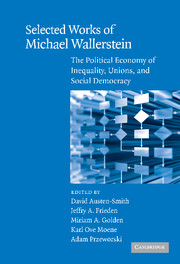 Selected Works of Michael Wallerstein
Selected Works of Michael Wallerstein Published online by Cambridge University Press: 27 January 2010
Capitalism is a system in which many scarce resources are owned privately, and decisions about allocating them are a private prerogative. Democracy is a system through which people as citizens may express preferences about allocating resources that they do not privately own. Hence the perennial question of political theory and of practical politics concerns the competence of these two systems with regard to each other. Is it possible for governments to control a capitalist economy? In particular, is it possible to steer the economy against the interests and preferences of those who control productive wealth?
The central and only distinctive claim of Marxist political theory is that under capitalism all governments must respect and protect the essential claims of those who own the productive wealth of society. Capitalists are endowed with public power, power which no formal institutions can overcome (Luxemburg 1970; Pashukanis 1951). People may have political rights, they may vote, and governments may pursue popular mandates. But the effective capacity of any government to attain whatever are its goals is circumscribed by the public power of capital. The nature of political forces that come into office does not alter these limits, it is claimed, for they are structural – a characteristic of the system, not of the occupants of governmental positions nor of the winners of elections.
During the past 20 years Marxists have developed several theories to explain why all governments in capitalist societies are bound to act in the interests of capitalists.
To save this book to your Kindle, first ensure [email protected] is added to your Approved Personal Document E-mail List under your Personal Document Settings on the Manage Your Content and Devices page of your Amazon account. Then enter the ‘name’ part of your Kindle email address below. Find out more about saving to your Kindle.
Note you can select to save to either the @free.kindle.com or @kindle.com variations. ‘@free.kindle.com’ emails are free but can only be saved to your device when it is connected to wi-fi. ‘@kindle.com’ emails can be delivered even when you are not connected to wi-fi, but note that service fees apply.
Find out more about the Kindle Personal Document Service.
To save content items to your account, please confirm that you agree to abide by our usage policies. If this is the first time you use this feature, you will be asked to authorise Cambridge Core to connect with your account. Find out more about saving content to Dropbox.
To save content items to your account, please confirm that you agree to abide by our usage policies. If this is the first time you use this feature, you will be asked to authorise Cambridge Core to connect with your account. Find out more about saving content to Google Drive.